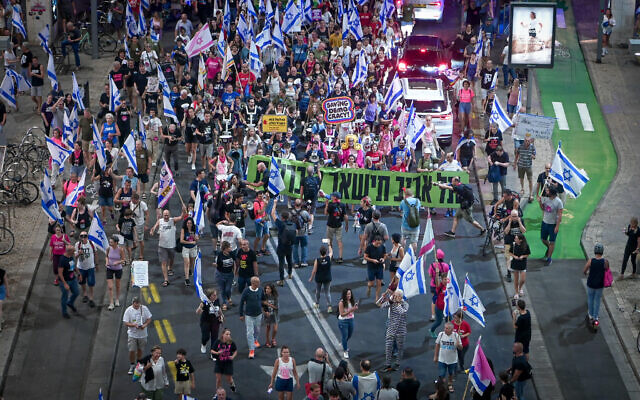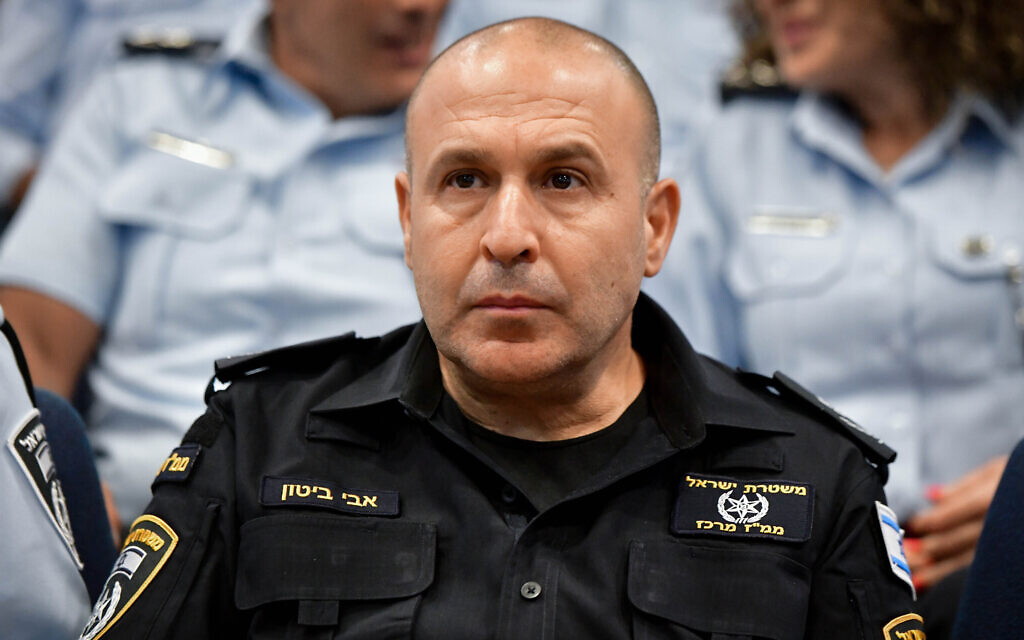Central police commander Avi Bitton on Thursday claimed the force is unable to tackle organized crime and record levels of deadly criminal violence in Arab towns because officers are focused on policing protests against the government’s judicial overhaul.
“These officers were meant to deal with crime in the Arab community, from where are they taken? Ultimately these officers belong to police stations and special units, and they are coming to deal with incidents of public order instead of crime,” Bitton told Army Radio, while calling “to strengthen” local police stations.
“This is also a mission, and we are also performing this mission with honor and respect it very much, but ultimately officers are not in the criminal sphere,” he added.
Bitton also declared himself as a “fit and worthy” candidate for the next police chief slated to be selected by far-right National Security Minister Itamar Ben Gvir, who has advocated for officers to deal more forcefully with the anti-government protests and is a leading proponent of the coalition’s proposals for weakening the judiciary.
“This is a very significant challenge in my opinion and I am always striving upwards,” the police commander said of the top job.
Following the interview, protest leaders railed at Bitton, accusing him of seeking to curry favor with Ben Gvir.
“Blaming the protests for the resounding failure to deal with crime and violence is a transparent attempt to flatter the failed TikTok minister,” Kaplan Force said in a statement, using a jibe commonly used by critics of Ben Gvir who say he is more focused on garnering headlines than governing.
The group also called for Bitton to retract his comments “against millions of law-abiding citizens who are going out to defend democracy.”

Anti-overhaul activists protest against the government in Tel Aviv on September 30, 2023. (Avshalom Sassoni/Flash90)
Police later came to Bitton’s defense, charging his remarks were being distorted “in an irresponsible, inciting and divisive manner” and saying that he was only describing the allocation of officers for various assignments.
“This is a fact and not an opinion,” the statement said in regards to the senior officer’s comments.
Police also said Bitton never spoke “against the protests” during the interview and said he constantly stresses “the upholding of the right to protest as a cornerstone of a democratic country.”
Opponents of the judicial shakeup have been holding mass protests since the beginning of the year against the government’s plans to curb the powers of the courts, drawing hundreds of thousands of people from many segments of Israeli society.
Critics of the overhaul say the legislative package will undermine Israel’s democracy and rights, and threaten the country’s security, economy and international standing. Its supporters say it will rein in an activist court system and restore power to elected officials.
The remarks by Bitton on Thursday came as Ben Gvir is expected to begin interviewing candidates for police chief. Since taking office late last year, Ben Gvir has sought to exert more influence over the police, leading to a sour relationship with Commissioner Kobi Shabtai. The National Security Ministry oversees the police force and Border Police.
Shabtai said in June that he will end his term in January and won’t seek an additional year in office.

Israel Police Commissioner Kobi Shabtai, left, and National Security Minister Itamar Ben Gvir at the scene of a terror attack in the West Bank settlement of Ma’ale Adumim, outside of Jerusalem, August 1, 2023. (Chaim Goldberg/Flash90)
In August, Ben Gvir and Shabtai sparred publicly over who the force must ultimately obey — the law or elected officials — with the police chief arguing the former and the far-right minister the latter.
The clash came ahead of two High Court hearings last month on petitions demanding that two laws passed by the government be struck down, and amid growing calls within the hard-right coalition for the political leadership to disobey a potential ruling of this sort.
Such a scenario would plunge Israel into a deep constitutional crisis, and could put the police in the position of having to choose whether to obey the government or the court.
A leading candidate to be the next commissioner, Coastal Region Police Commander Yoram Sofer, initially declined to say when asked how he would respond in such a scenario before later clarifying he would side with the High Court of Justice over the government in the case of a constitutional crisis.





